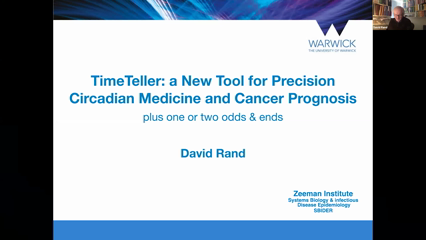MBI Videos
David Rand
-
 David RandRecent research has shown that the circadian clock has a much more profound effect on human health than previously thought. I will present a machine-learning approach to measuring circadian clock functionality from the expression levels of key genes in a single tissue sample and then apply this to study survival in a breast cancer clinical trail.
David RandRecent research has shown that the circadian clock has a much more profound effect on human health than previously thought. I will present a machine-learning approach to measuring circadian clock functionality from the expression levels of key genes in a single tissue sample and then apply this to study survival in a breast cancer clinical trail.
A principal aim of circadian medicine is to develop techniques and methods to integrate the relevance of biological time into clinical practice. However, it is difficult to monitor the functional state of the circadian clock and its downstream targets in humans. Consequently, there is a critical need for tools to do this that are practical in a clinical context and our approach tackles this. We apply our algorithm to breast cancer and show that in a large cohort of patients with non-metastatic breast cancer the resulting dysfunction metric is a prognostic factor for survival providing evidence that it is independent of other known factors. While previous work in this area is focused on individual genes, our approach directly assesses the systemic functionality of a key regulatory system, the circadian clock, from one sample.
